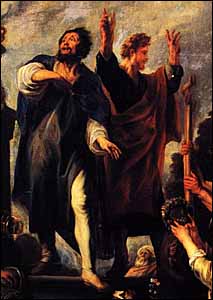Welcome to the new series of messages “Learn to evangelize with the Apostle Paul”. Was it an adaptation of the e-book?By John Crotts, available for free download. We hope you will learn from Paul’s model for evangelizing various audiences and being encouraged to share their faith. You can view articles and publication dates in our summary.
Paul and his companions did not arrive in Thessaloniki shortly after a Caribbean cruise. He also did not return from an autograph tour of his new book. In his first letter to the church born during his time in Thessaloniki, he wrote: “But despite being mistreated and outraged with Philips, as you know, we had a bold trust in our God, to proclaim to them the gospel of God, in the midst of too much struggle (1 Thessalonians 2:2).
- Paul certainly arrived in the city of Thessaloniki still feeling the pain of the blows and the time he spent in Philippes prison.
- Despite the difficulty of working at Philips and growing opposition to Thessaloniki.
- He spoke again courageously of Jesus.
Has the Holy Spirit surpassed, enlightened, and comforted Paul, so that his example is useless to normal Christians, like you and me?It is a fact that Paul was an Apostle of Jesus; He may have received a greater measure of the power of the Holy Ghost for ministry, but when we look at how he appealed to the churches for his prayers, it seems paul had a familiar sense of personal inadequacy. He implored the Ephesians to be with all prayer and supplication, praying at all times in the Spirit.
And for this, watching with perseverance and supplication for all the saints and also for me; that the word may be given to me, opening my mouth, to courageously make known the mystery of the Gospel, of which I am a chained ambassador, so that in Christ I may have the audacity to speak, as I must. (Ephesians 6: 18-20)
To the Colosssies, he wrote that he was not ashamed to ask for his intercession:
He perseveres in prayer, watching with gratitude. At the same time, pray also for us that God will open the door to speak, to speak of the mystery of Christ, of which I too am handcuffed; for me to manifest, how do I do it?(Colosssenses 4: 2-4)
And what was Paul’s message? The same good news as you and I are invited to proclaim in Christ’s commission; which was first for the Apostles and then for all believers until the end of time (Matthew 28:18-20). Paul is strongly motivated by the same gospel, the same call, and the same resources that you and I share. , “Be my imitators, how am I also of Christ?(1 Corinthians 11: 1). His bold example, in the midst of great hostility to the gospel, should encourage our weak hearts to act in our own spheres of life.
While it was very simple to suggest that Paul had a foolproof formula, which he used to reach every new city for Jesus, Luke’s account reveals a wide range of common activities that can certainly be called “a strategy. “Did you just run into a synagogue in Thessaloniki? He had a habit of looking for them (Acts 17:2). Church strata Jim Elliff identified the main points of Paul’s five-step approach to Thessaloniki and the other cities he visited. 1
After crossing Amphipolis and Apollonia, they arrived in Thessaloniki, where there was a synagogue of Jews (Acts 17:1).
Leaving Philippi, the team of “Paul”?took the great Roman road, Via Egnatia, which united Italy with Asia in the southwest. Lucas described the major cities they went through on his journey. Amphipolis was about 53 km from Philippi. Apollonia was 48 km ahead on the road. After another 56 km and, without a doubt, many stops to rest, they passed the sign “Welcome to Thessaloniki”.
There is no record of a ministry in these cities along the way. Did it just happen? For them. The reason may be the lack of synagogues in these cities, but the Bible does not give us the reasons, at least we can say that these cities were just stopping points on the way to the main destination.
Thessaloniki was the capital of the Roman province of Macedonia. It was an important city, right in the harbor, on the edge of the Gulf of Salica. The entire shopping route of Via Egnatia passed directly through the city. Rome made Thessaloniki a free city in 42 BC, so it was ruled much more according to a Greek standard than with the Roman.
There were many opportunities for the gospel before Paul and his friends.
The city had a lot of Jewish men, enough to form a synagogue. Paulo found him and began attending immediately.
?
Ver. John Stott, The Message of Acts (Sao Paulo, SP: ABU Editora, 1994), and I. Howard Marshall, Tyndale New Testament Commentaries: Acts (Grand Rapids, MI: Eerdmans Publishing Co. , 1980), 276. to many scholars for helping me understand and communicate the meaning of this glorious passage in its historical context. Although I have tried to quote all my sources, some of his thoughts may have entered this book unintentionally without any annotation. The helpful comments I’ve used are those of John Stott, I. Howard Marshall, Homer Kent, FFBruce, Kent Hughes and John Polhill. The full quotation of each of these works appears throughout the notes.

